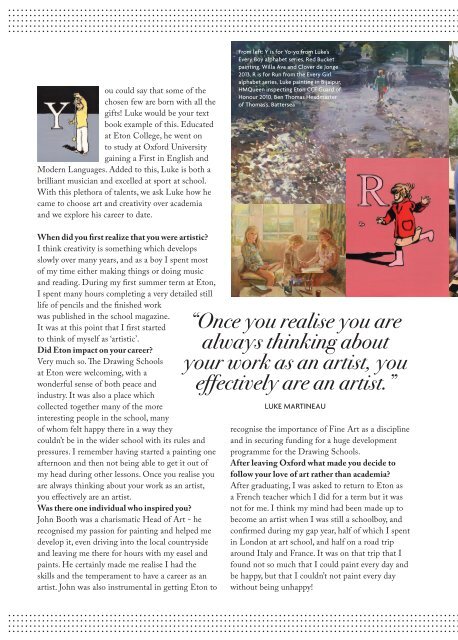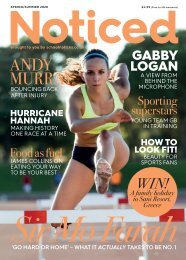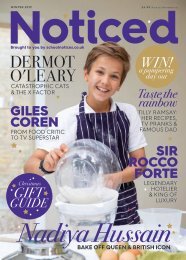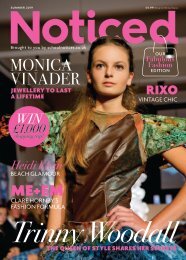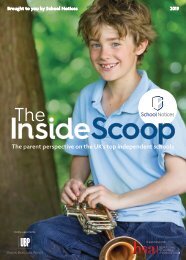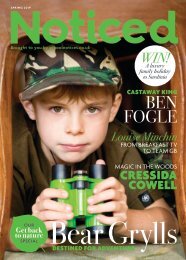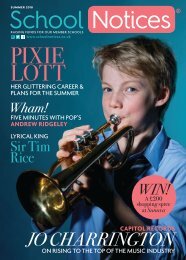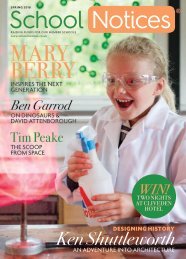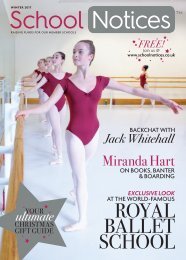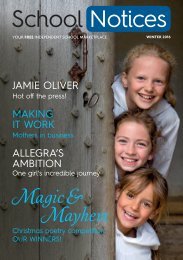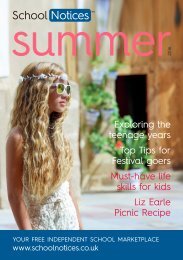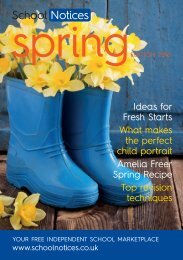Winter Edition 2018
Awesome creative alumni interviews with David Linley, David Yarrow, Sophie Ellis-Bextor and your ultimate Christmas gift guide make this our best edition yet!
Awesome creative alumni interviews with David Linley, David Yarrow, Sophie Ellis-Bextor and your ultimate Christmas gift guide make this our best edition yet!
Create successful ePaper yourself
Turn your PDF publications into a flip-book with our unique Google optimized e-Paper software.
ou could say that some of the<br />
chosen few are born with all the<br />
gifts! Luke would be your text<br />
book example of this. Educated<br />
at Eton College, he went on<br />
to study at Oxford University<br />
gaining a First in English and<br />
Modern Languages. Added to this, Luke is both a<br />
brilliant musician and excelled at sport at school.<br />
With this plethora of talents, we ask Luke how he<br />
came to choose art and creativity over academia<br />
and we explore his career to date.<br />
From left: Y is for Yo-yo from Luke’s<br />
Every Boy alphabet series, Red Bucket<br />
painting, Willa Ava and Clover de Jonge<br />
2013, R is for Run from the Every Girl<br />
alphabet series, Luke painting in Bijaipur,<br />
HMQueen inspecting Eton CCF Guard of<br />
Honour 2010, Ben Thomas Headmaster<br />
of Thomas’s, Battersea<br />
When did you first realize that you were artistic?<br />
I think creativity is something which develops<br />
slowly over many years, and as a boy I spent most<br />
of my time either making things or doing music<br />
and reading. During my first summer term at Eton,<br />
I spent many hours completing a very detailed still<br />
life of pencils and the finished work<br />
was published in the school magazine.<br />
It was at this point that I first started<br />
to think of myself as ‘artistic’.<br />
Did Eton impact on your career?<br />
Very much so. The Drawing Schools<br />
at Eton were welcoming, with a<br />
wonderful sense of both peace and<br />
industry. It was also a place which<br />
collected together many of the more<br />
interesting people in the school, many<br />
of whom felt happy there in a way they<br />
couldn’t be in the wider school with its rules and<br />
pressures. I remember having started a painting one<br />
afternoon and then not being able to get it out of<br />
my head during other lessons. Once you realise you<br />
are always thinking about your work as an artist,<br />
you effectively are an artist.<br />
Was there one individual who inspired you?<br />
John Booth was a charismatic Head of Art - he<br />
recognised my passion for painting and helped me<br />
develop it, even driving into the local countryside<br />
and leaving me there for hours with my easel and<br />
paints. He certainly made me realise I had the<br />
skills and the temperament to have a career as an<br />
artist. John was also instrumental in getting Eton to<br />
“Once you realise you are<br />
always thinking about<br />
your work as an artist, you<br />
effectively are an artist.”<br />
LUKE MARTINEAU<br />
recognise the importance of Fine Art as a discipline<br />
and in securing funding for a huge development<br />
programme for the Drawing Schools.<br />
After leaving Oxford what made you decide to<br />
follow your love of art rather than academia?<br />
After graduating, I was asked to return to Eton as<br />
a French teacher which I did for a term but it was<br />
not for me. I think my mind had been made up to<br />
become an artist when I was still a schoolboy, and<br />
confirmed during my gap year, half of which I spent<br />
in London at art school, and half on a road trip<br />
around Italy and France. It was on that trip that I<br />
found not so much that I could paint every day and<br />
be happy, but that I couldn’t not paint every day<br />
without being unhappy!


